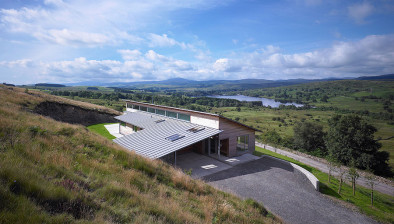Interview: Emerging Architect Award winner Neil Taylor

Neil Taylor
The inaugural RIAS/Saint-Gobain Emerging Architect Award recognises the crucial role architects play in delivering a better world and encourages the great architects of the future at the outset of their careers.
This year, the award went to TAP Architecture, recognising two innovative and technically challenging projects: the Aerial Adventures, East Kilbride, and the Scottish National Waterski Centre, Dunfermline.
SCN speaks to Neil Taylor, managing director at TAP Architecture, to find out a bit more about the awarded projects and his role at TAP Architecture.
What were your first thoughts when you were announced the winner of the Saint-Gobain Emerging Architect Award?
2016 was a hugely busy and challenging year of work for the practice. I was delighted that our efforts were being acknowledged and rewarded.
You’ve seen some of your projects awarded in the past – i.e. the Castle MacLellan Foods, winner of an RIAS building of the year award 2016. Were you somehow expecting another distinction this year?
The 2016 RIAS award was the first that the practice had received since I took over as Managing Director of the practice in 2012. It was a huge moment for us and although we had two projects shortlisted this year, I was trying hard not to expect too much. Given the strength of the other nominees, winning the Emerging Architect Award was a lovely surprise at the end of the evening.
In one word, how would you describe your architectural style?
Emerging.

The Aerial Adventures project in East Kilbride. Image by David Barbour
You’ve seen two projects distinguished with the Emerging Architects Award: The Scottish Waterski Centre, in Dunfermline, and the Aerial Adventures, in East Kilbride. What was your inspiration for the these projects?
The two projects have very different briefs and circumstances. The Scottish Waterski Centre was to provide a space from which people would be able to appreciate the spectacle of the water sports. To do this we created a dynamic, glazed pavilion, on the water’s edge.
The Aerial Adventures project was a one-off; a climbing wall and assault course suspended over an ice rink. We wanted these elements to appear to be crystalline and translucent, with smooth surfaces that hug the contours of the existing building.
Was any of them particularly challenging? What would you highlight in each of them?
The Aerial Adventures project was very demanding, due to the geometrical complexity of the design that was developed. Also, because we had to ensure that the proposals worked within the constraints within the existing ice rink arena and the wider shopping mall. We then had only a narrow window of opportunity for our contractors to carry out the installation, as the building was undergoing a major reconstruction at the same time; reaching completion only a few hours before the official opening event began.

Scottish National Waterski Centre, Dunfermline. Image by David Barbour
How has the design impacted the comfort and well- being for the end users?
The original Waterski Centre building was not a comfortable place to spend time in – there was no insulation, the heating was insufficient, there were bare blockwork walls and no outlook to the Loch. We installed insulated ceiling and wall linings, as well as new and efficient heating and lighting systems throughout, providing warm spaces for the skiers and the spectators to wait and watch the activities on the water. We also improved the accessibility of the facility with level access to and from the waterside. Both this and the Aerial Adventures project promote challenging, sporting activities.
Are you working on any exciting projects at the moment? Is that a chance that you will submit them to next year’s RIAS Awards?
We have several interesting projects on site at the moment: two new-build houses in rural settings and another ambitious project for Aerial Adventures. Hopefully, they will be worthy of submission to next year’s Awards.
- More on Neil Taylor and TAP Architecture can be found here.














